
Lennox Claudius Lewis is a boxing commentator and former professional boxer who competed from 1989 to 2003. He is a three-time world heavyweight champion, a two-time lineal champion, and heavyweight undisputed champion. Holding dual British and Canadian citizenship, Lewis represented Canada as an amateur at the 1984 and 1988 Olympics; in the latter, he won a gold medal in the super-heavyweight division.
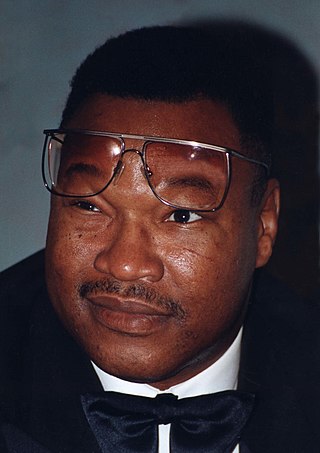
Larry Holmes is an American former professional boxer who competed from 1973 to 2002 and was world heavyweight champion from 1978 until 1985. He is often considered to be one of the greatest heavyweight boxers of all time. He grew up in Easton, Pennsylvania, which led to his boxing nickname of the "Easton Assassin".
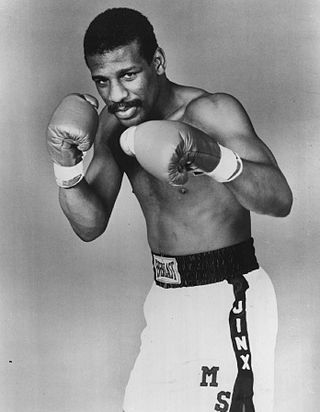
Michael Spinks is an American former professional boxer who competed from 1977 to 1988. He held world championships in two weight classes, including the undisputed light heavyweight title from 1983 to 1985, and the lineal heavyweight title from 1985 to 1988. As an amateur he won a gold medal in the middleweight division at the 1976 Summer Olympics.

Evander Holyfield is an American former professional boxer who competed between 1984 and 2011. He reigned as the undisputed champion at cruiserweight in the late 1980s and at heavyweight in the early 1990s, and is the only boxer in history to win the undisputed championship in two weight classes in the three belt era, a feat beaten by Oleksander Usyk in 2024 when he became undisputed in two weight classes in the four belts era. Nicknamed "the Real Deal", Holyfield is the only four-time world heavyweight champion, having held the unified WBA, WBC, and IBF titles from 1990 to 1992, the WBA and IBF titles again from 1993 to 1994, the WBA title a third time from 1996 to 1999; the IBF title a third time from 1997 to 1999 and the WBA title for a fourth time from 2000 to 2001.

Boxing in the 1980s was filled with important fights, events and personalities that shaped the sport. Boxing in the 1980s was shaped by many different situations, such as the continuous corporate battles between the different world sanctioning organizations, the void left by Muhammad Ali as the sport's ambassador and consequent search for a new boxing hero, the continuous presence of Don King as the sport's most famous promoter, the surge of rival promoters as Bob Arum, Butch Lewis and Murad Muhammad, and major rule changes. In 1986, Mike Tyson emerged as a fresh new face in the heavyweight division, which had seen a decline in champion quality level after Ali's retirement and, later on, after longtime WBC ruler Larry Holmes' prime. In addition, the IBF and WBO began operating.
As in the 1980s, the 1990s in boxing's popularity focused on all divisions. When 1980s legends Sugar Ray Leonard, Thomas Hearns, as well as others retired, newer superstars filled the void: Pernell Whitaker, Julio César Chávez, in the early 1990s, Oscar De La Hoya, Félix Trinidad, Roy Jones Jr. and Floyd Mayweather Jr. in the mid to late 1990s.
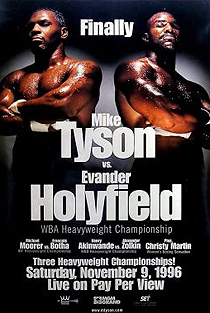
Mike Tyson vs. Evander Holyfield, billed as Finally, was a professional boxing match fought between Evander Holyfield and Mike Tyson for the WBA heavyweight championship on November 9, 1996, at the MGM Grand Garden Arena in Paradise, Nevada. The bout was Tyson's first defence of the WBA title that he had won from Bruce Seldon on September 7 of that year.

Mike Tyson vs. Michael Spinks, billed as Once and For All, was a professional boxing match which took place on June 27, 1988. Both fighters were undefeated and each had a claim to being the legitimate heavyweight champion. At the time, Tyson held the belts of all three of the major sanctioning organizations while Spinks was The Ring and Lineal champion, regarded as "The People's Champion," and was considered the lineal champion. The fight was held at the Convention Hall, Atlantic City, New Jersey U.S., it was at the time the richest fight in boxing history, grossing some $70 million, of which Tyson earned a record purse of around $22 million and Spinks $13.5 million. Tyson won the fight, knocking out Spinks in 91 seconds.
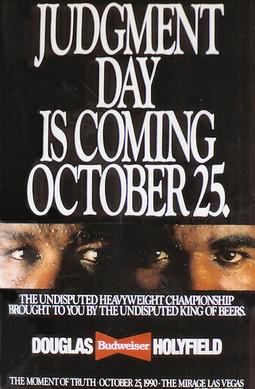
Buster Douglas vs. Evander Holyfield, billed as "The Moment of Truth", was a professional boxing match contested on October 25, 1990, for the WBA, WBC, and IBF heavyweight championships. The bout took place at the Mirage in Paradise, Nevada, USA and saw Douglas making the first defense of the titles he won from Mike Tyson in February 1990.
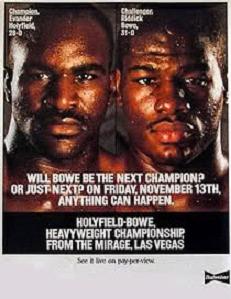
Evander Holyfield vs. Riddick Bowe was a professional boxing match that took place on November 13, 1992 in Las Vegas, Nevada. The fight was contested for the undisputed world heavyweight championship, which consisted of the WBA, WBC, and IBF championships.

Evander Holyfield vs. Lennox Lewis, billed as Undisputed, was a professional boxing match contested on March 13, 1999 for the WBA, WBC, and IBF heavyweight championships.

Mike Tyson vs. James Smith, billed as Super Fight, was a professional boxing match contested on March 7, 1987 for the WBA and WBC heavyweight championships, as part of the heavyweight unification series.

Mike Tyson vs. Tony Tucker, billed as The Ultimate, was a professional boxing match contested on August 1, 1987 for the WBA, WBC, and IBF heavyweight championships.

Mike Tyson vs. Tyrell Biggs, billed as The Clash for the Crown, was a professional boxing match contested on October 16, 1987, for the undisputed heavyweight championship, which consists of the WBA, WBC and IBF heavyweight titles.

Mike Tyson vs. Tony Tubbs was a professional boxing match contested on March 21, 1988 for the WBA, WBC, and IBF heavyweight championships.

Evander Holyfield vs. Bert Cooper, billed as "The Homecoming", was a professional boxing match contested on November 23, 1991, for the WBA and IBF heavyweight championships.

Mike Tyson vs. Pinklon Thomas, billed as Hard Road to Glory, was a professional boxing match contested on May 30, 1987, for the WBA and WBC heavyweight championships.
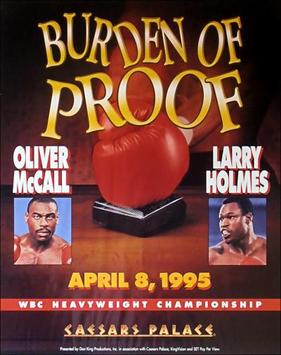
Oliver McCall vs. Larry Holmes, billed as "Burden of Proof", was a professional boxing match contested on April 8, 1995 for the WBC Heavyweight Championship. The undercard included world championship bouts in four other categories.
The heavyweight unification series, also known as the Heavyweight World Series, was a sequence of professional boxing matches held in 1986 and 1987 to crown an undisputed champion of the heavyweight class. The series was produced by HBO Sports and promoted by Don King. It ended with Mike Tyson as undisputed champion, holding the championship belts of the International Boxing Federation (IBF), World Boxing Association (WBA), and World Boxing Council (WBC).
The second fight between Tim Witherspoon and James "Bonecrusher" Smith was contested on December 12, 1986. The bout took place at Madison Square Garden in New York City and was contested for Witherspoon's WBA heavyweight championship. It was Witherspoon’s second defence of the championship he had won from Tony Tubbs in January 1986.

















